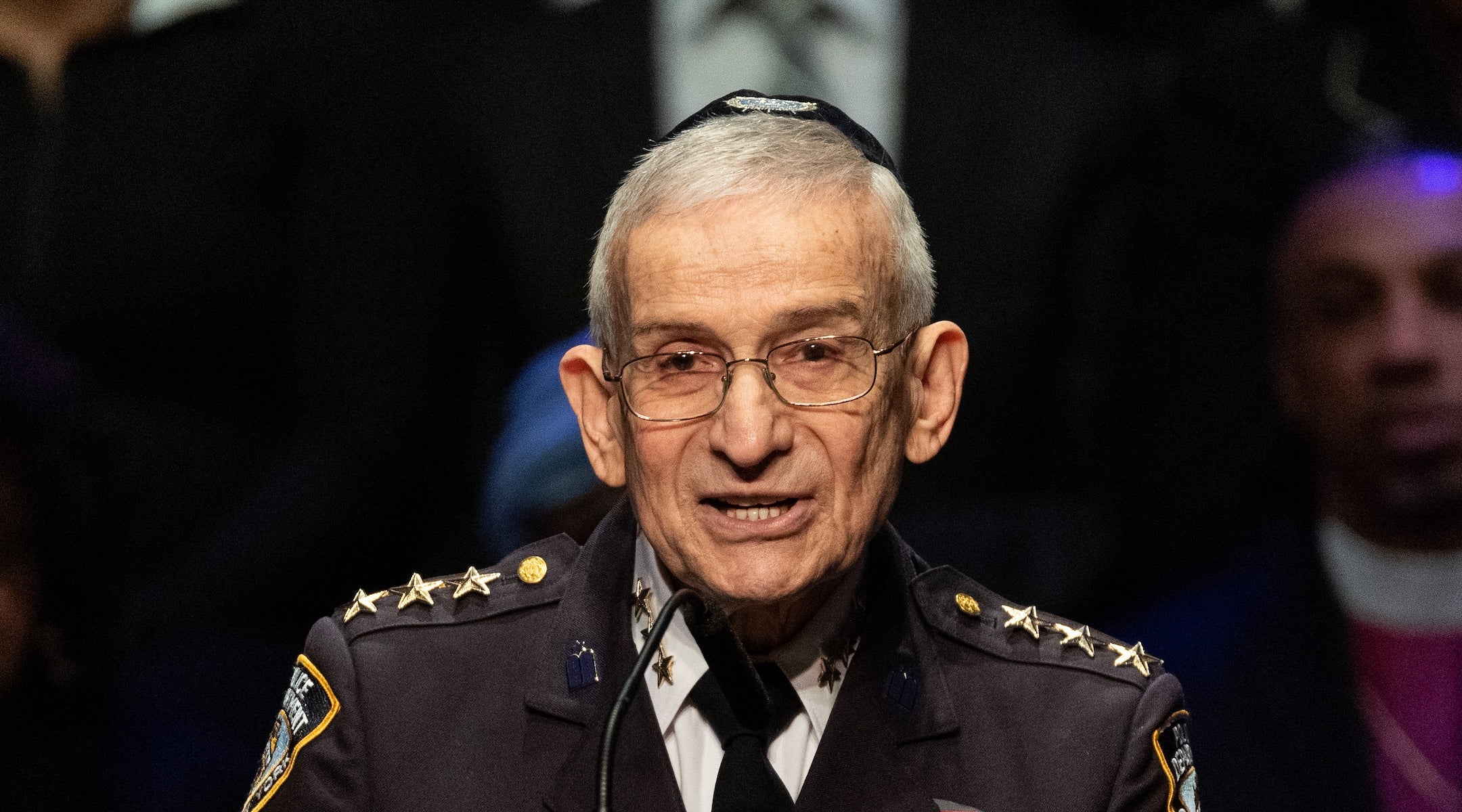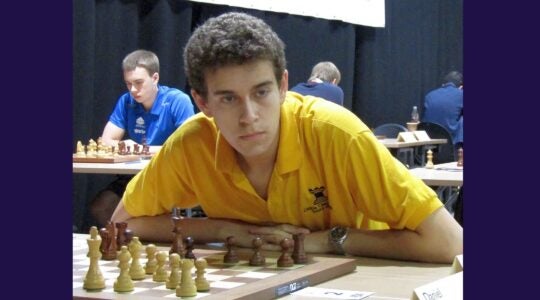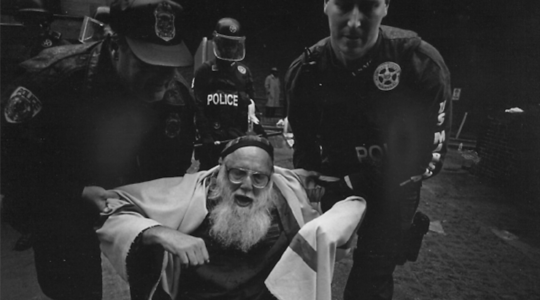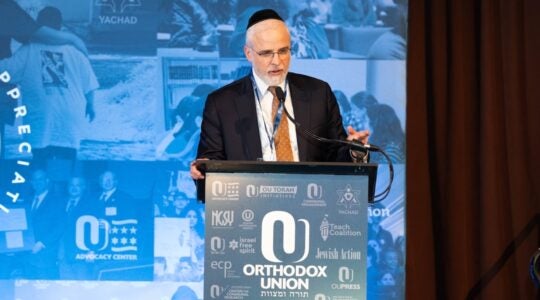Less than a week after rushing to Ground Zero as a police chaplain on 9/11, Rabbi Alvin Kass led Rosh Hashanah services — not only for his Brooklyn congregation but at a makeshift synagogue at LaGuardia Airport for emergency responders who had flooded into New York City after the terrorist attacks.
“It was,” he would later say, “the most meaningful religious service in my career.”
Kass died early Wednesday at 89 as the longest-serving chaplain in the New York Police Department, with a career that included responses to global terrorism, local violence and the intimate needs of police officers — as well as a hostage crisis that he famously resolved with a non-kosher pastrami sandwich.
He had worked until weeks before his death and, days earlier, had tuned in from his hospital room to a ceremony honoring him for 60 years of service within the NYPD.
“As our longtime spiritual director, he anchored Shomrim in Torah values and service, guiding us through milestones, line-of-duty tragedies, and everyday decisions alike,” the Shomrim Society, a fraternal organization for Jewish police officers, said in a statement. “His counsel shaped our traditions, his presence steadied our hearts, and his example set the standard for what it means to be a Shomrim leader.”
Born and raised in New Jersey, Kass attended Camp Ramah before enrolling at Columbia University in 1953. His freshman-year roommates there were Robert Alter, who would become a preeminent translator of the Bible, and Shalom Schwartz, later a leading psychologist in Israel.
After graduating from college, he earned both a doctorate from New York University and ordination as a Conservative rabbi from the Jewish Theological Seminary of America before joining the U.S. Air Force as a chaplain. Returning stateside, he took a pulpit in Queens before being urged to join the city’s police department as a chaplain.
At the time, he was only the third Jewish chaplain to work for the NYPD. He would become its longest-serving and the first three-star chaplain, working under eight mayors and 21 police chiefs.
At the same time, Kass spent decades in congregations, helming the East Midwood Jewish Center, a Conservative synagogue in Brooklyn, for 36 years until his retirement in 2014.
“He was just a very kind and unassuming person — and a dream to work with,” said Rabbi Sam Levine, the synagogue’s current rabbi who also served as cantor during Kass’ tenure. “His gifts allowed him to lead this community through some very difficult times, particularly over a battle over egalitarianism, which he was extremely devoted to.”
Kass had been exempted from courses intended to teach rabbis-to-be how to deliver sermons, Levine said, because he was so gifted a speaker, delivering complex comments extemporaneously to great effect. “It was like watching a magician in a way,” he said.
The NYC Benevolent Association called Kass “a true pillar of the NYPD” in a Facebook post mourning him. “Every time we bowed our heads for one of his prayers, we appreciated his deep faith, his old-school wit and his unshakable devotion to the men and women who protect NYC,” the group said. “He was a champion of all that is good and noble about our profession. May his memory be a blessing.”
NYPD Police Commissioner Jessica Tisch, who is Jewish, mourned Kass in a statement following his death. She noted that he was the youngest chaplain in the department’s history when he came on at age 30.
“Nearly six decades later, he remained its spiritual heart — a source of strength, guidance, and faith for generations of police officers and their families,” Tisch said, adding, “His loss is immeasurable. His example is everlasting.”
Within the NYPD, Kass was responsible for the spiritual care of all officers but especially the thousands who are Jewish. Kass successfully advocated for the right of Jewish police officers not to work on Shabbat and major Jewish holidays while also serving as the primary Jewish figure for Jewish officers who were otherwise unaffiliated with Jewish communities.
“The main responsibility for a spiritual leader is to bring all people closer together, including those of your own faith,” he told the New York Jewish Week when he was honored as one of “36 to Watch” in 2024. “I feel particularly proud that the Shomrim Society embraces Jews of all backgrounds and points of view. The organization is a paragon of the unity that ought to bind all Jews together.”
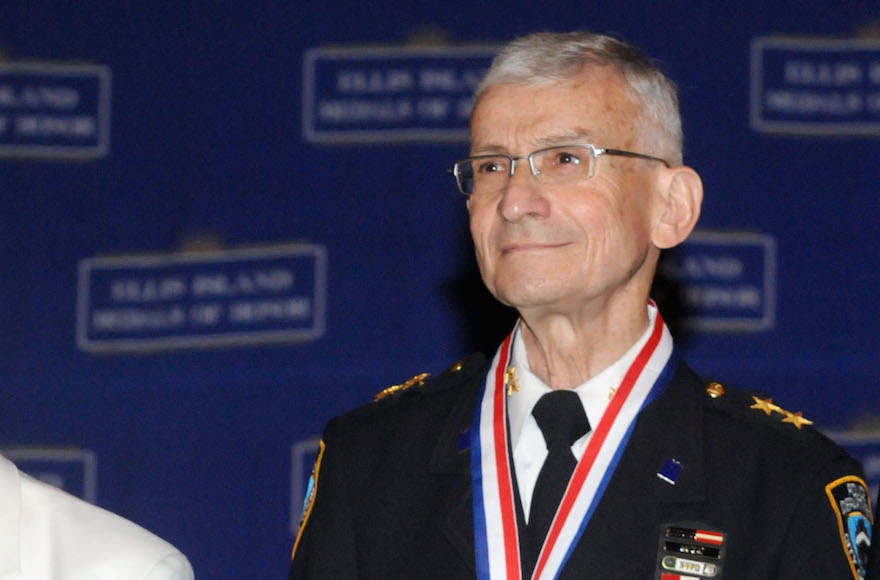
NYPD Chief Chaplain Rabbi Alvin Kass receiving the Medal of Honor at the 23rd annual Ellis Island Medals of Honor ceremony and gala on Ellis Island, New York City, May 9, 2009. (George Napolitano/Getty Images)
After the terrorist attacks in Lower Manhattan on Sept. 11, 2001, Kass reported to Ground Zero, where he encountered a police officer he described as “crying like a baby” as well as the families of officers who were unaccounted for. Later, he attended the funerals of ever police officer who was killed that day, including two who were Jewish.
“I told their families that you’re supposed to say ‘Baruch atah Adonai, eloheinu melech ha’olam, dayan ha emet’: Blessed is the Lord our God, ruler of the universe, who is a judge of truth, or truthful judge. This means, essentially, that He knows what He’s doing. We don’t,” Kass wrote in an essay for The Forward on the 20th anniversary of the attack.
“We can’t comprehend what He’s doing very often, but presumably He knows what he is doing, and we submit. We bow our head to what is often inscrutable and incomprehensible, and we accept it with a measure of faith and hope,” he continued. “That really is the essential message of Judaism, in the face of evil.”
Kass would later say that 9/11 marked a transition in the role of the chaplain within the NYPD, peeling back some of the stigma that had been associated with seeking spiritual care in a department where machismo was long the currency.
Kass’ own encounters on the job ranged from lofty to the low-brow. He was pulled away from his son’s bar mitzvah celebration to tend to an officer who had been shot, according to a 2006 profile in the Columbia alumni magazine. On another occasion he flew upstate between Friday night services and Shabbat morning services to inform a family that their officer son had been murdered.
One of Kass’s more famous escapades came in 1981 when he was called in to negotiate with a Jewish man who had taken a woman hostage.
“I talked to him all night to give up his gun,” Kass recalled in a 2012 interview with the Wall Street Journal, neither the first nor last time he would recount the incident. “I was an utter failure. But by morning he was hungry.”
The hostage team ordered pastrami sandwiches from the (non-kosher) Carnegie Deli for the hostage-taker and for Kass. Kass traded one overstuffed sandwich for the man’s gun — but it turned out he had another. Kass, who ate only kosher meat, had not touched his sandwich and persuaded the man to accept it in exchange for the other gun. The police swooped in and ended the crisis.
The NYPD commissioner noted the incident when promoting Kass to three-star chief in 2016, saying, “In a feat that has become legendary, you were able to trade two pastrami sandwiches for the man’s two guns.”
But for Kass, whose small stature added to a widespread impression of modesty, the real feat came not in his ability to disarm the hostage-taker but in the man’s appetite. “Have you seen the sandwiches from the Carnegie Deli?” he recalled. “They’re huge.”
Kass is survived by his three children and three grandchildren. He was married for 54 years to Miryom Kass, an educator, until her death in 2017. Speaking at the 2016 ceremony marking 50 years with the NYPD, Kass said about Miryom, “She has been by confidant, my partner, my co-worker, she’s been my inspiration, she’s been my chaplain.”
JTA has documented Jewish history in real-time for over a century. Keep our journalism strong by joining us in supporting independent, award-winning reporting.
